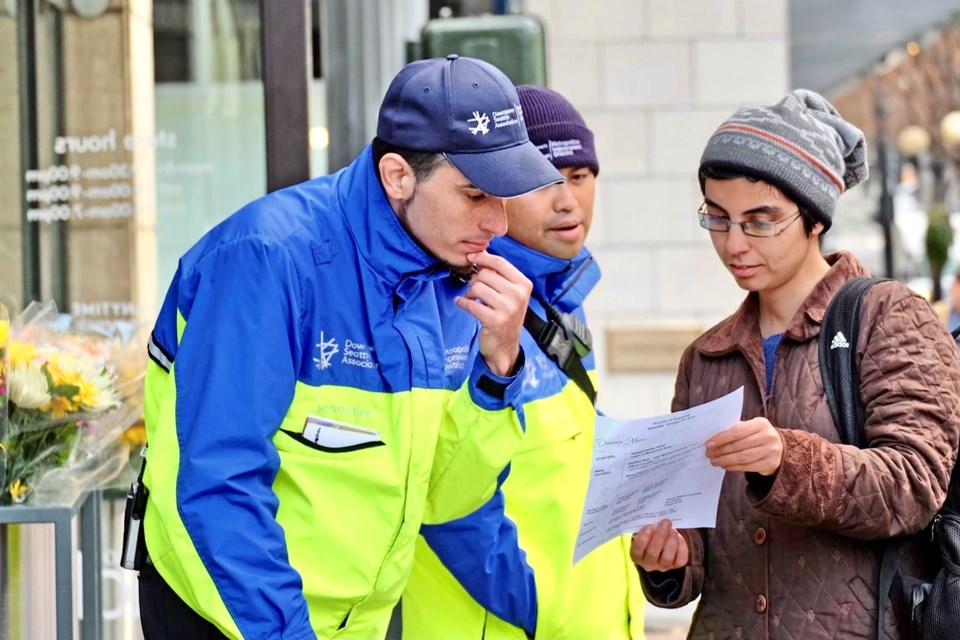A one-year, city-funded street outreach pilot project is launching Monday in Queenstown.
The new Downtown Ambassadors program will be run by Canadian Mental Health Association (CMHA) in partnership with City of Sault Ste. Marie and the Downtown Association.
"It has a dual purpose," says Annette Katajamaki, executive director of Canadian Mental Health Association Algoma.
"It's both for residents and visitors to Sault Ste. Marie," Katajamaki said during a meeting of the Downtown Association last week.
"The purpose of the program is to provide some street outreach in the downtown Sault Ste. Marie area. Hopefully promoting safety and cleanliness."
"It's connecting the downtown community closer together," Katajamaki said.
"Some of the things we're hoping to do are distributing harm-reduction supplies – needles and things like that – and provision of resources to the local vulnerable."
"As you know we've seen a lot more people living on the streets or being on the streets. What do they need? What can we give them so that they can move on and get their needs met?"
Katajamaki said all staff are trained to administer the opioid overdose-reversing drug naloxone and to perform primary first aid.
"We're there to assess the individuals and provide any social service referrals that they may need."
The new street workers will also provide direction to tourists and locals.
"If we see somebody who seems to be lost or looking for something... we'll have a contact list on hand."
The first pair of uniformed ambassadors will hit the streets at 3 p.m. Monday and walk until 7 p.m.
Hours are subject to change but shifts from Monday through Friday are initially set for 3 to 7 p.m.
"Saturday and Sunday from 10 until 6," Katajamaki told the Downtown Association directors.
The ambassador shifts are complemented by city-funded overnight patrols by N1 Solutions security officers.
"We're not security and we’re not police," Katajamaki said.
"We're not going to put ourselves into a place of danger for our staff or for anyone else in the downtown."
City police have assured CMHA they will respond as quickly as possible to any ambassadors requesting assistance.
But the new street ambassadors are prepared to respond to reports of overturned trash bins or homeless individuals sleeping in front of stores.
In her presentation last week, Katajamaki said ambassadors "will be wearing some kind of uniform, possibly a jacket or a vest" with reflective tape.
"They're peer workers who are specifically trained and certified by Canadian Mental Health Association to be able to, from their own lived experience, help folks with mental health and addictions, and those that are most vulnerable and the homeless."
There will be two peer workers on each shift who will take their lunch breaks together to assure mutual safety.
"They've lived with their own mental health and addictions and their homelessness issues, but they have been in recovery for a long time and they can engage with people in a very different way than we can as formal support or businesses," Katajamaki told the meeting.
"These are the same peers who are working in our harm-reduction hub on Queen Street, working on the community wellness bus, who are giving navigation services at Sault Area Hospital emergency room, and the same peers who provide housing support in a couple of our housing programs here in Sault Ste. Marie."
CMHA Algoma has trained about 20 peers to rotate through these jobs.
"The clients and potential clients start to recognize them and feel comfortable with them and hopefully engage with them more," Katajamaki said.
The program will operate out of the main CMHA Algoma office at 386 Queen Street East.
Ambassadors will work the traditional downtown – a territory extending north to Wellington, south to Bay, west to Gore, and east to Pim.
"But not just the main streets. We're also looking at walking on the side streets and in the alleyways."
Initially, there are no set routes.
"We're really just trying to get the folks out there, to start walking, to see where the hot spots are."
Each ambassador will have a backpack, which Katajamaki says will contain everything except the kitchen sink:
- first aid kits
- personal protective equipment including gloves
- snacks
- needle disposal bins
- harm reduction kits
- cell phones programmed with a number that businesses may call
- a panic button or alarm
- resource information
- a safety whistle
- hand sanitizer
- tongs
- disinfectant wipes
- masks
- a protocol directory
- naloxone kits
- hygiene kits
- a blanket
About 800 client interactions are expected during the one-year Sault pilot, as well as approximately 190 calls for support.
CMHA Algoma is also willing to provide training to local businesses and their staff on dealing with street concerns.
Over the first month, visits are planned to all downtown businesses and storefronts.
The Sault's Downtown Ambassador program is modelled after a similar service launched 23 years ago in Seattle.
The Seattle ambassadors cover 285 square blocks downtown.
Last year, they helped 14,386 people with directions and removed 34,838 graffiti tags and 1.4 million gallons of trash.
